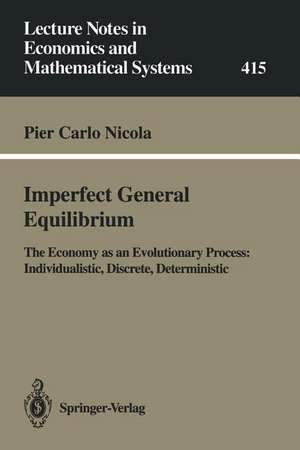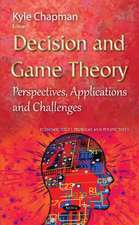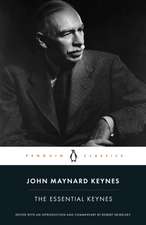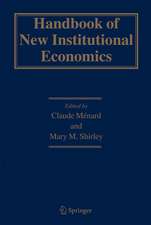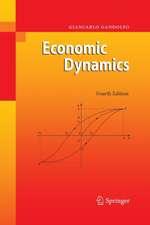Imperfect General Equilibrium: The Economy as an Evolutionary Process: Individualistic, Discrete, Deterministic: Lecture Notes in Economics and Mathematical Systems, cartea 415
Autor Pier C. Nicolaen Limba Engleză Paperback – 29 aug 1994
Din seria Lecture Notes in Economics and Mathematical Systems
-
 Preț: 360.02 lei
Preț: 360.02 lei -
 Preț: 383.93 lei
Preț: 383.93 lei -
 Preț: 384.09 lei
Preț: 384.09 lei -
 Preț: 380.07 lei
Preț: 380.07 lei -
 Preț: 446.26 lei
Preț: 446.26 lei -
 Preț: 497.37 lei
Preț: 497.37 lei -
 Preț: 380.84 lei
Preț: 380.84 lei -
 Preț: 384.86 lei
Preț: 384.86 lei -
 Preț: 378.34 lei
Preț: 378.34 lei -
 Preț: 399.67 lei
Preț: 399.67 lei - 20%
 Preț: 360.93 lei
Preț: 360.93 lei - 15%
 Preț: 643.16 lei
Preț: 643.16 lei -
 Preț: 379.09 lei
Preț: 379.09 lei -
 Preț: 404.74 lei
Preț: 404.74 lei -
 Preț: 385.62 lei
Preț: 385.62 lei - 15%
 Preț: 644.49 lei
Preț: 644.49 lei -
 Preț: 379.09 lei
Preț: 379.09 lei -
 Preț: 345.50 lei
Preț: 345.50 lei -
 Preț: 425.80 lei
Preț: 425.80 lei -
 Preț: 378.34 lei
Preț: 378.34 lei - 18%
 Preț: 775.65 lei
Preț: 775.65 lei -
 Preț: 392.60 lei
Preț: 392.60 lei -
 Preț: 401.61 lei
Preț: 401.61 lei - 15%
 Preț: 646.43 lei
Preț: 646.43 lei -
 Preț: 382.18 lei
Preț: 382.18 lei -
 Preț: 378.34 lei
Preț: 378.34 lei - 15%
 Preț: 637.59 lei
Preț: 637.59 lei - 15%
 Preț: 647.27 lei
Preț: 647.27 lei -
 Preț: 377.73 lei
Preț: 377.73 lei -
 Preț: 447.84 lei
Preț: 447.84 lei - 15%
 Preț: 644.49 lei
Preț: 644.49 lei -
 Preț: 386.00 lei
Preț: 386.00 lei - 15%
 Preț: 654.43 lei
Preț: 654.43 lei -
 Preț: 415.02 lei
Preț: 415.02 lei -
 Preț: 411.54 lei
Preț: 411.54 lei -
 Preț: 398.92 lei
Preț: 398.92 lei -
 Preț: 398.92 lei
Preț: 398.92 lei -
 Preț: 392.75 lei
Preț: 392.75 lei - 15%
 Preț: 635.47 lei
Preț: 635.47 lei - 20%
 Preț: 653.56 lei
Preț: 653.56 lei -
 Preț: 379.86 lei
Preț: 379.86 lei -
 Preț: 495.46 lei
Preț: 495.46 lei -
 Preț: 447.99 lei
Preț: 447.99 lei -
 Preț: 378.71 lei
Preț: 378.71 lei - 15%
 Preț: 637.13 lei
Preț: 637.13 lei -
 Preț: 385.84 lei
Preț: 385.84 lei -
 Preț: 378.54 lei
Preț: 378.54 lei - 15%
 Preț: 666.55 lei
Preț: 666.55 lei -
 Preț: 380.07 lei
Preț: 380.07 lei
Preț: 381.98 lei
Nou
Puncte Express: 573
Preț estimativ în valută:
73.09€ • 76.66$ • 60.85£
73.09€ • 76.66$ • 60.85£
Carte tipărită la comandă
Livrare economică 01-15 aprilie
Preluare comenzi: 021 569.72.76
Specificații
ISBN-13: 9783540581024
ISBN-10: 3540581022
Pagini: 188
Ilustrații: XI, 167 p.
Dimensiuni: 155 x 235 x 10 mm
Greutate: 0.27 kg
Ediția:Softcover reprint of the original 1st ed. 1994
Editura: Springer Berlin, Heidelberg
Colecția Springer
Seria Lecture Notes in Economics and Mathematical Systems
Locul publicării:Berlin, Heidelberg, Germany
ISBN-10: 3540581022
Pagini: 188
Ilustrații: XI, 167 p.
Dimensiuni: 155 x 235 x 10 mm
Greutate: 0.27 kg
Ediția:Softcover reprint of the original 1st ed. 1994
Editura: Springer Berlin, Heidelberg
Colecția Springer
Seria Lecture Notes in Economics and Mathematical Systems
Locul publicării:Berlin, Heidelberg, Germany
Public țintă
ResearchCuprins
1 Meaningful Elements of Economic Thought.- 1.1 Some Predecessors.- 1.2 Walras and Associates.- 1.3 Modern Competitive Theories.- 1.4 Temporary General Equilibrium.- 1.5 General non Competitive Equilibrium 14.- 1.6 Fixed Prices and Rationing.- 1.7 Game Theory and Market Forms.- 1.8 Sequential Equilibria and Rational Expectations.- 2 Introductory Examples.- 2.1 Summary of a One Period Walrasian Model.- 2.2 A “Vital Utility” Index.- 2.3 Numerical Experiments.- 2.4 Conclusion.- 3 Goods, Money, Public Administration.- 3.1 Goods.- 3.2 Money.- 3.3 Prices and Values.- 3.4 Labour.- 3.5 Public Goods and Public Administration.- 4 Firms.- 4.1 Preliminaries.- 4.2 The Firm.- 4.3 Present Choices.- 4.4 Intertemporal Decisions.- 4.5 Existence of an Optimal Program.- 4.6 Revising Decisions.- 4.7 Market Choices by Firms.- 5 Consumers.- 5.1 Preliminaries.- 5.2 Consumers.- 5.3 Conclusion.- 6 Imperfect General Equilibrium.- 6.1 General Environment.- 6.2 The Network of Exchanges.- 6.3 Imperfect Temporary General Equilibrium.- 6.4 Updating Prices.- 7 Dynamics and Growth, Stationary Equilibria.- 7.1 Some Elements on Evolutionary Processes.- 7.2 Stationary Equilibria.- 7.3 Endogenous Cycles. Chaos.- 8 Numeric Simulations. Cycles and Quasi-Chaos.- 8.1 Society and the Computer.- 8.2 Main Features.- 8.3 Firms’ Decisions.- 8.4 Labour Rationing.- 8.5 Consumers’ Decisions.- 8.6 Effective Transactions.- 8.7 Updating Parameters in Calendar Time.- 9 Micro-Analysis versus Macro-Synthesis.- 9.1 Microeconomics and Macroeconomics.- 9.2 Aggregation.- 9.3 Aggregations in the Imperfect Model.- 10 Epilogue.- A.1 Linear Spaces.- A.2 Topological Spaces and Metric Spaces.- A.3 Linear Topological Spaces.- A.4 Normed Spaces and Banach Spaces.- References.- Name Index.
